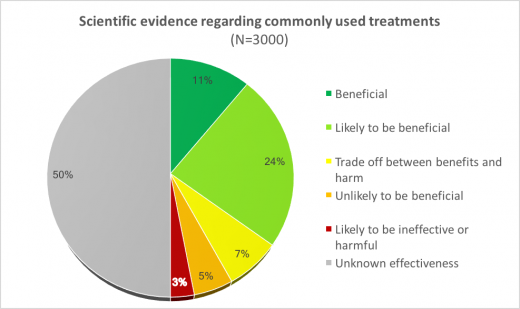Are conventional medicine and homeopathy both evidence-based?
Whether we are discussing conventional or homeopathic medicine, science is much more of a grey area than we might wish.
As ‘The Conversation’ reported in 2022, “We don’t know whether most medical treatments work, and we know even less about whether they cause harm”1. This headline was prompted by a review of research on 1,567 conventional medical treatments, assessed over a 13-year period (2008-2021) which found that 95% of treatments do not have high-quality evidence to support their benefits.
“More than 9 in 10 healthcare interventions studied within recent Cochrane Reviews are not supported by high-quality evidence, and harms are under-reported.”2
Analysis by the British Medical Journal’s (BMJ) Clinical Evidence3 shows that just 11% of 3,000 commonly used NHS treatments are known to be beneficial:
The amount of research carried out in conventional medicine is vast compared with the relatively new field of homeopathy research, but when you look at the balance of evidence – the percentage of trials which are positive, negative or inconclusive – they are remarkably similar for the two disciplines.
Research must continue in all fields to help policy makers, patients and clinicians make the best possible decisions, but at the moment, many decisions cannot be based on scientific evidence, because there is just insufficient data.
- ‘The Conversation’, June 17, 2022 | Link
- Howick J, Koletsi D, Ioannidis JPA et al. Most healthcare interventions tested in Cochrane Reviews are not effective according to high quality evidence: a systematic review and meta-analysis. J Clin Epidemiol. 2022 Aug;148:160-169. | PubMed
- BMJ Clinical Evidence, Efficacy Categorisations. 2017. Available from http://clinicalevidence.
bmj.com/x/set/static/cms/ efficacy-categorisations.html [Accessed 25 Sept 2017]














